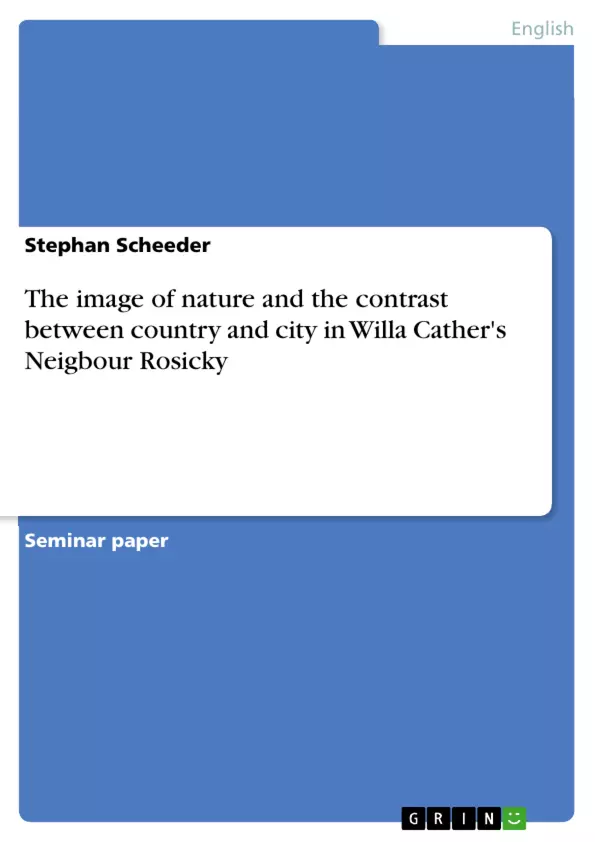Bibliography: page 15
In the short story "Neighbour Rosicky" the author Willa Cather tells the tale of the old czech farmer Anton Rosicky and his family. Cather describes Rosicky′s present life as well as his past which is presented in several flash back scenes and in form of a narrative told by old Rosicky himself.
One of the central motives in the story is the image of nature. It is embedded in descriptions of the Nebraska country, which Cather depicts very enthusiastically. However, the picture of nature and country is presented in various ways with the help of different techniques. One of the goals of this paper is to examine Cather′s use of stylistic devices and that of her images and metaphors. Cather also strives to give the reader a very certain picture of the country itself and of country life. Again Willa Cather tries to employ different ways of presenting this picture.
The picture nature and country, throughout the entire short story, is set against the contrasting image of the city and it′s inhabitants and is ultimately the dominating contrast of the story since it best describes Cather′s own thoughts on the topic, as well as conveying her message to the reader.
The first indication of an image of nature is given very early in the story in the description of Rosicky himself. He is described as having a "naturally high forehead"1 and his physical appearance is generally defined "through the use of earth tones"2 such as his brown creased face with a ruddy color or his long brown mustache3. Dr. Ed Burleigh also notices that Rosicky′s children have "natural good manners."4
This introduction of the imagery of nature as quoted above is very subtle. The main character Rosicky, who combines the attributes of nature within himself or his family, is introduced in a very likable and sympathetic way from the very beginning of the story. Therefore the reader is unconsciously presented with a positive point of view of nature.
Also, the ability of nature to improve human appearance is highlighted when Mary Rosicky puts one of her dark flowers into Ed Burleigh′s buttonhole.
[...]
Table of Contents
- The Image of Nature and the Contrast Between Country and City in Willa Cather's "Neighbour Rosicky"
Objectives and Key Themes
This paper examines Willa Cather's short story "Neighbour Rosicky," focusing on the portrayal of nature and the contrast between country and city life. It analyzes Cather's stylistic choices and imagery to understand how she constructs these contrasting images and conveys her message to the reader.
- The contrasting images of nature and city life.
- Cather's use of stylistic devices and imagery.
- The impact of Rosicky's experiences on his perspective.
- The role of freedom and land ownership in Rosicky's life.
- The development of Rosicky's character and his connection to nature.
Chapter Summaries
The Image of Nature and the Contrast Between Country and City in Willa Cather's "Neighbour Rosicky": This paper analyzes Willa Cather's short story, "Neighbour Rosicky," exploring the author's depiction of nature and the stark contrast she draws between rural and urban life. The story follows Anton Rosicky, a Czech farmer, and his family, weaving together descriptions of present-day life with flashbacks detailing his past. The paper delves into Cather's masterful use of imagery and stylistic devices to showcase the beauty of the Nebraska countryside, while simultaneously painting a contrasting picture of the harshness and impersonal nature of city life as experienced by Rosicky. The analysis focuses on how these contrasting environments shape Rosicky's character, his values, and his aspirations for his children, ultimately highlighting Cather's own views on the subject.
Keywords
Willa Cather, Neighbour Rosicky, nature imagery, country life, city life, contrast, stylistic devices, freedom, land ownership, character development.
Frequently Asked Questions: Willa Cather's "Neighbour Rosicky" - A Literary Analysis
What is the main focus of this literary analysis?
This paper analyzes Willa Cather's short story, "Neighbour Rosicky," focusing primarily on the contrasting depictions of nature and city life, and how these contrasting settings shape the protagonist's character and values. It examines Cather's writing style and the use of imagery to create these contrasting images and convey her message.
What are the key themes explored in the analysis?
The key themes include the contrasting images of nature and city life; Cather's stylistic choices and imagery; the impact of Rosicky's experiences on his perspective; the role of freedom and land ownership in Rosicky's life; and the development of Rosicky's character and his connection to the natural world.
What is included in the provided preview?
This preview offers a comprehensive overview of the analysis, including the title, table of contents, objectives and key themes, a chapter summary, and keywords.
What is the chapter summary about?
The chapter summary details the analysis of Willa Cather's depiction of nature and the contrast between rural and urban life in "Neighbour Rosicky." It highlights how Cather uses imagery and stylistic devices to showcase the beauty of the countryside and the harshness of city life, and how these contrasting environments influence Rosicky's character, values, and aspirations for his children.
What are the keywords associated with this analysis?
The keywords are: Willa Cather, Neighbour Rosicky, nature imagery, country life, city life, contrast, stylistic devices, freedom, land ownership, and character development.
What is the overall objective of this academic work?
The objective is to understand how Willa Cather uses literary techniques to portray the contrasting images of nature and city life in "Neighbour Rosicky" and how these contrasts contribute to the story's overall meaning and impact on the reader. It aims to analyze Cather's stylistic choices and their effect on the reader's understanding of the characters and themes.
- Citar trabajo
- Stephan Scheeder (Autor), 2001, The image of nature and the contrast between country and city in Willa Cather's Neigbour Rosicky, Múnich, GRIN Verlag, https://www.grin.com/document/7871



